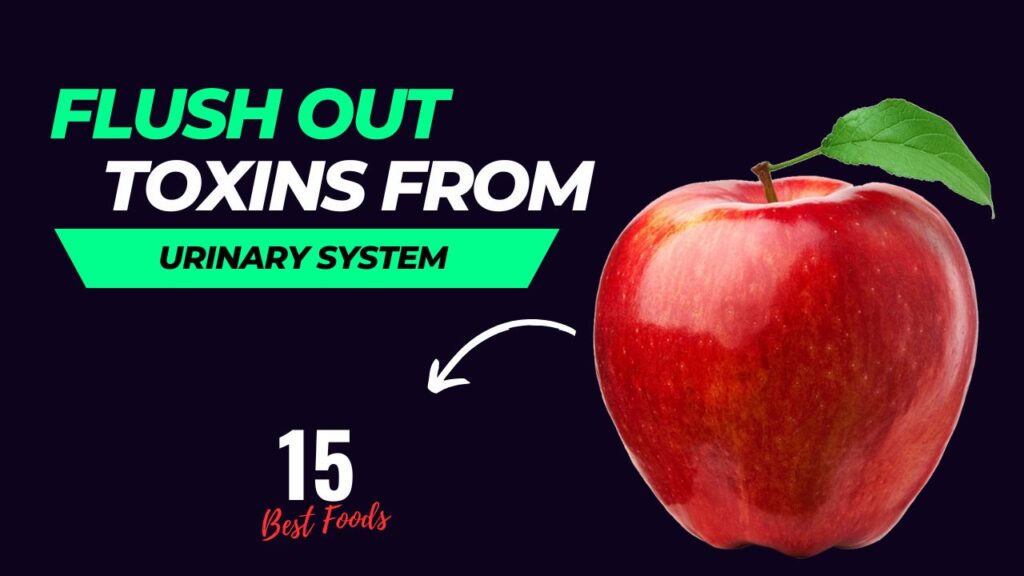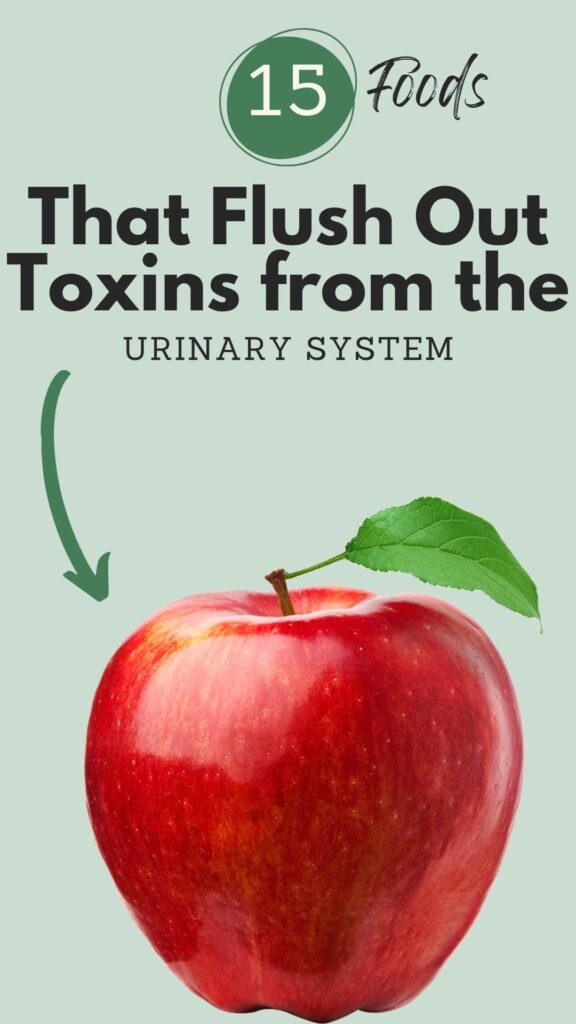Struggling with frequent urinary infections, bloating, or low energy? What many don’t realize is that your urinary system plays a key role in keeping your body clean and balanced.
It filters waste, flushes out toxins, and ensures your body stays hydrated and healthy. Yet, modern diets, stress, and lack of water often overload the system, leading to discomfort and even long-term health issues.
Here’s something you may not know: the right foods can naturally detoxify your urinary system—helping prevent infections, reducing inflammation, and supporting kidney and bladder health. While expensive detox drinks flood the market, nature already provides powerful options.
In this post, we’ll explore 15 science-backed foods that support urinary health, explain how to use them, who should consume or avoid them, storage tips, and possible side effects.

Table of Contents

15 Foods For Urinary System To Flush Out Toxins
1. Cranberries
Cranberries are widely known as one of the best foods for urinary health because they contain proanthocyanidins, compounds that prevent harmful bacteria from sticking to the urinary tract walls.
Best Ways to Eat or Use It
- Fresh cranberries in smoothies
- Unsweetened cranberry juice
- Dried cranberries (in moderation)
Who Should Eat / Avoid
- Good for: women prone to UTIs, people with weak immunity
- Avoid: if you’re on blood-thinning medications (like warfarin)
Storage & Buying Tips
- Buy firm, bright red berries
- Store in the refrigerator for up to 3 weeks
- Freeze for long-term use
Do’s & Don’ts
| ✅ Do | ❌ Don’t |
|---|---|
| Choose unsweetened juice | Overconsume sweetened cranberry products |
| Pair with water for hydration | Rely on juice alone for UTI prevention |
Possible Side Effects
Too much cranberry juice may cause stomach upset or increase kidney stone risk in some individuals.
2. Watermelon
Did you know watermelon is 92% water? It’s not just a summer refreshment—it’s also a natural diuretic that helps flush toxins from the kidneys and bladder.
Best Ways to Eat or Use It
- Fresh slices as snacks
- Watermelon juice
- Fruit salad
Who Should Eat / Avoid
- Good for: athletes, those prone to dehydration
- Avoid: if diabetic (moderation is key due to natural sugar)
Storage & Buying Tips
- Pick melons with a yellow field spot (sign of ripeness)
- Refrigerate cut pieces and eat within 3 days
Do’s & Don’ts
| ✅ Do | ❌ Don’t |
|---|---|
| Eat fresh for hydration | Store cut watermelon outside the fridge |
| Pair with mint for extra refreshment | Consume in excess if you have high blood sugar |
Possible Side Effects
Overeating may cause bloating due to high water and fiber content.
3. Cucumber
Cucumbers are rich in water and antioxidants. They help reduce inflammation in the bladder and act as a mild diuretic.
Best Ways to Eat or Use It
- Add to salads or detox water
- Blend into cold soups
- Use in sandwiches
Who Should Eat / Avoid
- Good for: weight-loss seekers, people prone to water retention
- Avoid: if you have digestive sensitivity (can cause burping)
Storage & Buying Tips
- Choose firm cucumbers with dark green skin
- Store in a paper towel inside the fridge to extend freshness
Do’s & Don’ts
| ✅ Do | ❌ Don’t |
|---|---|
| Eat raw for hydration | Peel unnecessarily (skin has nutrients) |
| Add to infused water | Store near ethylene-producing fruits (like bananas) |
Possible Side Effects
Can cause mild bloating in some people when eaten in excess.
4. Garlic
Garlic is a natural antimicrobial that prevents infections in the urinary system. It’s also known to boost immunity.
Best Ways to Eat or Use It
- Raw, crushed for maximum allicin release
- Cooked in soups, curries, or stir-fries
- Garlic tea (for strong detox effect)
Who Should Eat / Avoid
- Good for: those prone to urinary infections
- Avoid: if you have bleeding disorders or are about to undergo surgery
Storage & Buying Tips
- Store in a cool, dry place (not the fridge)
- Avoid sprouted garlic (it becomes bitter)
Do’s & Don’ts
| ✅ Do | ❌ Don’t |
|---|---|
| Crush before use to activate allicin | Overconsume raw garlic (can irritate stomach) |
| Add to warm dishes | Store in airtight containers (can mold) |
Possible Side Effects
Excess raw garlic can cause stomach upset or bad breath.
5. Lemons
Lemons alkalize urine and prevent the growth of bacteria in the urinary tract. They are also rich in vitamin C, which boosts immunity.
Best Ways to Eat or Use It
- Warm lemon water in the morning
- Lemon juice in salads
- Add to detox water with cucumber and mint
Who Should Eat / Avoid
- Good for: people with recurrent UTIs
- Avoid: if you have acid reflux or ulcers
Storage & Buying Tips
- Pick heavy lemons with thin skin
- Store in the fridge for longer shelf life
Do’s & Don’ts
| ✅ Do | ❌ Don’t |
|---|---|
| Drink diluted lemon water | Drink too much on empty stomach (acidic) |
| Add zest for extra nutrients | Store cut lemons uncovered |
Possible Side Effects
May erode tooth enamel if consumed excessively.
6. Celery
Celery contains natural compounds that act as diuretics, helping flush out toxins from kidneys and bladder.
Best Ways to Eat or Use It
- Celery sticks as snacks
- Add to juices or smoothies
- Use in soups and salads
Who Should Eat / Avoid
- Good for: people with high blood pressure
- Avoid: if you have kidney inflammation (may overstimulate)
Storage & Buying Tips
- Choose crisp stalks with fresh green color
- Store wrapped in aluminum foil to keep fresh longer
Do’s & Don’ts
| ✅ Do | ❌ Don’t |
|---|---|
| Eat raw for best diuretic effect | Leave stalks unwrapped (loses crispness) |
| Pair with hummus for snacks | Store too long (becomes stringy) |
Possible Side Effects
Too much celery juice may cause diarrhea in sensitive individuals.
7. Ginger
Ginger improves digestion and has anti-inflammatory properties, which help reduce urinary discomfort.
Best Ways to Eat or Use It
- Ginger tea
- Add fresh ginger to smoothies
- Use in stir-fries or curries
Who Should Eat / Avoid
- Good for: people with digestive issues, cold, or bloating
- Avoid: if you’re on blood-thinning medication
Storage & Buying Tips
- Choose firm, wrinkle-free ginger roots
- Store in the fridge wrapped in a paper towel
Do’s & Don’ts
| ✅ Do | ❌ Don’t |
|---|---|
| Use fresh for best benefits | Use dried ginger as substitute for detox |
| Add to warm teas | Store in plastic (causes molding) |
Possible Side Effects
Excess ginger can cause heartburn or stomach upset.
8. Apples
“An apple a day keeps the doctor away”—this includes urinary infections. Apples are high in fiber and antioxidants that support detoxification.
Best Ways to Eat or Use It
- Eat raw as snacks
- Blend into smoothies
- Add slices to salads
Who Should Eat / Avoid
- Good for: anyone looking to boost immunity and detox
- Avoid: if allergic or sensitive to fructose
Storage & Buying Tips
- Store apples in the fridge to keep fresh longer
- Avoid bruised or overly soft apples
Do’s & Don’ts
| ✅ Do | ❌ Don’t |
|---|---|
| Eat with skin for fiber | Peel unnecessarily |
| Choose organic if possible | Store near onions (absorbs odor) |
Possible Side Effects
Too many apples may cause bloating due to fiber content.
9. Parsley
Parsley isn’t just a garnish—it’s a natural diuretic and rich in antioxidants like flavonoids and vitamin C. It supports kidney function by flushing out excess salt and water, which helps reduce urinary infections and bloating.
Best Ways to Eat or Use It
- Fresh parsley in salads or soups
- Blend into detox juices or smoothies
- Brew parsley tea for urinary cleansing
Who Should Eat / Avoid
- Good for: people with water retention, those prone to UTIs
- Avoid: if pregnant (can overstimulate the uterus) or on blood-thinners
Storage & Buying Tips
- Choose vibrant green leaves without yellowing
- Store wrapped in a damp paper towel inside the fridge
- Freeze chopped parsley in ice cube trays for later use
Do’s & Don’ts
| ✅ Do | ❌ Don’t |
|---|---|
| Use fresh parsley for maximum nutrients | Overcook (destroys vitamin C) |
| Add raw to salads or juices | Store in airtight containers (causes decay) |
Possible Side Effects
Excess consumption may irritate kidneys in people with pre-existing kidney conditions.
10. Beets
Beets are a powerhouse for detoxification. Their betalains help support liver and kidney function, while their high nitrate content improves blood circulation, aiding toxin removal through urine.
Best Ways to Eat or Use It
- Fresh beetroot juice
- Roasted or steamed beets in salads
- Beetroot soup or hummus
Who Should Eat / Avoid
- Good for: athletes (boosts endurance), people with low iron levels
- Avoid: if prone to kidney stones (high oxalate content)
Storage & Buying Tips
- Pick firm beets with smooth skin
- Store in the refrigerator without washing until use
- Keep leaves attached to extend shelf life
Do’s & Don’ts
| ✅ Do | ❌ Don’t |
|---|---|
| Drink beet juice for detox | Panic at red urine (harmless beeturia) |
| Eat with greens for added minerals | Store in plastic bags (causes sweating) |
Possible Side Effects
May temporarily turn urine or stools red—a harmless effect known as beeturia.
11. Blueberries
These small berries pack a punch against urinary tract infections thanks to antioxidants and proanthocyanidins, similar to cranberries. They also reduce inflammation in the bladder.
Best Ways to Eat or Use It
- Eat fresh as a snack
- Add to yogurt, oatmeal, or smoothies
- Use in fruit salads
Who Should Eat / Avoid
- Good for: women prone to UTIs, people seeking antioxidant-rich diets
- Avoid: if allergic to berries or sensitive to histamines
Storage & Buying Tips
- Choose firm, plump berries with a deep blue color
- Store unwashed in the fridge for up to a week
- Freeze for long-term use
Do’s & Don’ts
| ✅ Do | ❌ Don’t |
|---|---|
| Eat raw for maximum antioxidant benefit | Wash before storage (causes spoilage) |
| Freeze for smoothies | Overconsume if prone to diarrhea |
Possible Side Effects
Too many blueberries may cause digestive upset in sensitive stomachs.
12. Carrots
Carrots contain beta-carotene and antioxidants that help reduce inflammation in the urinary system. Their high water content also supports hydration and toxin removal.
Best Ways to Eat or Use It
- Raw carrot sticks as snacks
- Fresh carrot juice
- Steamed or roasted carrots with meals
Who Should Eat / Avoid
- Good for: children, adults with weak immunity, weight-loss diets
- Avoid: if allergic or if you have very high vitamin A levels (rare)
Storage & Buying Tips
- Choose firm carrots with bright orange color
- Store in the fridge, wrapped in a damp paper towel
- Avoid carrots with cracks or limp texture
Do’s & Don’ts
| ✅ Do | ❌ Don’t |
|---|---|
| Eat raw for maximum benefits | Store near apples (causes bitterness) |
| Pair with olive oil for vitamin absorption | Overcook (loses nutrients) |
Possible Side Effects
Overeating carrots may cause harmless orange tint to skin (carotenemia).
13. Tomatoes
Tomatoes are rich in lycopene and vitamin C, both of which help reduce bladder inflammation and support urinary system health.
Best Ways to Eat or Use It
- Fresh tomato juice
- Tomato-based soups or sauces
- Sliced in salads and sandwiches
Who Should Eat / Avoid
- Good for: people with frequent urinary discomfort, those seeking antioxidants
- Avoid: if you have acid reflux (may worsen symptoms)
Storage & Buying Tips
- Buy firm, red tomatoes without bruises
- Store at room temperature until ripe, then refrigerate
- Use ripe tomatoes for sauces and soups
Do’s & Don’ts
| ✅ Do | ❌ Don’t |
|---|---|
| Pair with olive oil to boost lycopene absorption | Store unripe tomatoes in the fridge |
| Use fresh in salads | Eat too much if prone to acidity |
Possible Side Effects
Overconsumption may cause stomach acidity in sensitive individuals.
14. Green Tea
Green tea is rich in catechins, powerful antioxidants that help reduce urinary inflammation and prevent bacterial growth in the bladder.
Best Ways to Eat or Use It
- Brew fresh green tea (not bottled)
- Add lemon or ginger for extra detox effect
- Drink warm between meals
Who Should Eat / Avoid
- Good for: weight-loss seekers, people with recurrent UTIs
- Avoid: if sensitive to caffeine or pregnant (limit intake)
Storage & Buying Tips
- Buy loose-leaf tea for better quality
- Store in an airtight container in a cool, dark place
Do’s & Don’ts
| ✅ Do | ❌ Don’t |
|---|---|
| Drink 1–2 cups daily | Overconsume (can cause caffeine jitters) |
| Brew fresh, not bottled | Drink on empty stomach if sensitive |
Possible Side Effects
Too much green tea may cause headaches, insomnia, or stomach upset due to caffeine.
15. Pumpkin Seeds
Pumpkin seeds are rich in zinc and omega-3 fatty acids, which support bladder control and reduce inflammation in the urinary tract.
Best Ways to Eat or Use It
- Eat roasted pumpkin seeds as snacks
- Add to salads, smoothies, or yogurt
- Blend into seed butter
Who Should Eat / Avoid
- Good for: men’s prostate health, women with bladder issues
- Avoid: if allergic to seeds or on very low-calorie diets (high in calories)
Storage & Buying Tips
- Choose raw or roasted seeds without added salt
- Store in airtight jars to prevent rancidity
- Refrigerate for longer freshness
Do’s & Don’ts
| ✅ Do | ❌ Don’t |
|---|---|
| Eat as a healthy snack | Overeat (high in calories) |
| Combine with salads for crunch | Store in humid places (causes spoilage) |
Possible Side Effects
Eating too many can cause mild digestive discomfort due to high fiber and fat content.
Conclusion
The urinary system is your body’s natural filter, and keeping it healthy is essential for overall wellness.
From cranberries and blueberries that fight infections, to parsley and watermelon that flush out toxins, and even pumpkin seeds that support bladder strength, these 15 foods provide a simple, natural way to detox your system every day.
Incorporating just a few of these into your meals can:
- Reduce the risk of urinary tract infections
- Support kidney and bladder health
- Improve hydration and toxin removal
- Boost overall energy and immunity
The best part? These are everyday foods you can easily add to your smoothies, salads, snacks, or teas.
Start small—pick one or two foods this week and make them part of your routine. Your body will thank you.
Which of these foods will you try first? Share your favorite recipes or hacks in the comments below!
Frequently Asked Questions (FAQs)
Can these foods replace UTI medication?
No. While these foods support urinary health and may reduce the risk of infections, they are not a replacement for prescribed medication. If you suspect a urinary tract infection, consult a doctor.
How long does it take to see results from eating these foods?
You may notice improved hydration, reduced bloating, and better energy levels within a week of regular intake. However, for long-term urinary health benefits, consistency over several weeks to months is key.
How much water should I drink along with these foods?
Aim for 8–10 glasses of water daily. These foods work best when paired with proper hydration, since water helps flush toxins and supports kidney function.
Are these foods safe for pregnant women?
Yes, most of them are safe and even beneficial during pregnancy (like carrots, apples, and cucumbers). However, foods like parsley (in excess) and too much green tea should be avoided. Always consult your doctor before making dietary changes during pregnancy.
Can children eat these foods for urinary health?
Absolutely. Many of these foods—such as watermelon, carrots, apples, and blueberries—are safe and healthy for children. Just keep portion sizes moderate and avoid choking hazards like whole pumpkin seeds.
Do these foods help prevent kidney stones?
Some do, like lemons (citric acid helps break down small stones) and cucumbers (hydration). However, others like beets and spinach are high in oxalates and should be limited if you are prone to kidney stones.
Can I just take supplements instead of eating these foods?
Whole foods provide a combination of nutrients, fiber, and antioxidants that supplements can’t fully replicate. Supplements may help in specific cases (e.g., cranberry extract), but they should not replace a nutrient-rich diet.
Can these foods cure urinary incontinence or bladder leakage?
No single food can cure incontinence. However, pumpkin seeds, cranberries, and antioxidant-rich foods may support bladder strength and reduce irritation, which helps manage symptoms. For chronic incontinence, consult a healthcare provider.










